London Film Festival 2018 Report 2: From Cannibal Comedies To “Spa Westerns”
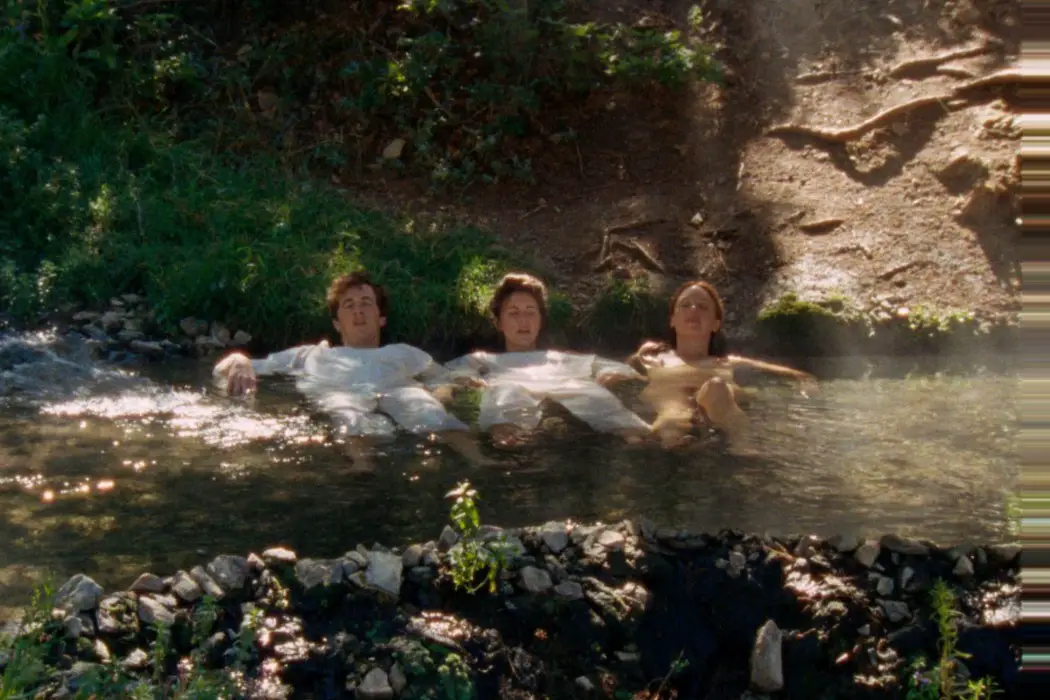
Alistair is a 25 year old writer based in Cambridge.…
We’re back with our second report from this year’s London Film Festival. The festival kicks off properly this week (October 10), which means that our next reports will begin to balance out our takes on the big hitters of the upcoming awards season, with as many brand new discoveries as we can possibly find within the expansive programme.
This week, we’re sticking with the hidden discoveries theme to offer our thoughts on some of the most ambitious films we’ve found in the programme. A satire on capitalism starring cannibals, a musical “spa western”, and a borderline unclassifiable Chinese directorial debut were among the films our team caught this week – they weren’t all perfect (heck, some of them weren’t even necessarily good), but they do all act as testimony to just how eclectic this year’s London Film Festival programme is. If you’re an adventurous moviegoer, you could do a lot worse than tracking any of these down to try for yourself.
The Cannibal Club (Guto Parente)
Charlie Nicholson: The most irrefutable fact of Guto Parente’s bluntly dark comedy is that Octavio and Gilda are very rich indeed. Comfortably married with a wealth of servile staff, they have the romantic double staircase and the sleek marble floors, and throw delicately-dressed dinners while holding suitably reformed small talk. They also eat people – as is quickly established within the film’s opening moments – which most often arises as the satisfying result of a semi-sexual power fantasy entirely intended by Parente to satirise the bourgeois for devouring their seemingly endless supply of employees.
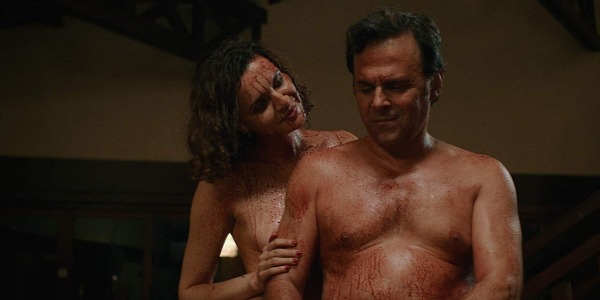
It leans more than a little on cult appeal. Indeed, the couple’s behaviour becomes something of a cult itself, for their bizarre ritual is actually part of the wider operations of The Cannibal Club; an exclusive circle of upper class flesheaters, who are – ironically enough – indebted to each other, and to “principles” they repeatedly tell themselves they naturally embody.
The loyalty is quickly ironised, however, when Gilda discovers a deep secret between one of the household servants and the club’s rabid leader, Borges, prompting the organisation to change its agenda to prevent this sensitive information getting out.
With neither subtlety nor much control, Parente turns refined social hierarchy into an animalistic free-for-all, revealing the rich’s pervasive need to retain dominance over a heathen underclass of “poors.” Octavio’s hotheaded tantrums when presented with anything other than absolute obsequy quickly raise patriarchal elite and megalomania as one and the same thing, and the bureaucracy of corporate structure becomes plain in extended performances of Chinese whispers. Meanwhile, the central hook itself laxes into a grotesque display of the insatiable bourgeois hunger for material gain, and the ultimate expendability of the labourer trapped within it.
Though leagues from Dogtooth in grace, Parente and Lanthimos perhaps share similar aims in wryly jabbing at elusive social power-holders and their oppression of the oblivious, but pure working classes. For all its transitory silliness and occasional dullness, there’s nevertheless something satisfying about seeing the self-destructive nature of desperate power play, quite literally, laid bare.
Dreamaway (Johanna Domke and Marouan Omara)
Andrew Winter: Around 300 miles south-east of the Egyptian capital, Cairo, you’ll find the holiday resort of Sharm el Sheikh. Once bustling and busy, tourist numbers went into freefall after the 2011 Arab Spring, and carried on plummeting following 2015’s ISIS bombing of a Russian passenger plane, which had taken off from the local airport.
Johanna Domke and Marouan Omara’s unusual documentary was clearly filmed at the resort’s lowest ebb. Throughout Dreamaway, Sharm resembles a sci-fi ghost town in which life-like robots carry on as normal waiting for their human masters to return from the stars. DJ Taki plays a nightclub set to a janitor mopping the floor, Shosha and the rest of the activities team perform a poolside dance routine (“Wakey, wakey, Sharm el Shakey”), that no one is around to see.

The film focuses on six resort staff – housekeeper Horreya, driver Hossam, masseur Alaa, human statue Rami, and the aforementioned Shosha and Taki. Domke and Omara have little interest in why the resort has hit hard times, only in those the downturn has affected. But while that may have been interesting in a short film of, say, 30 minutes or so, the idea doesn’t quite stretch to an hour and a half. Proceedings feel padded out and, halfway through, I’d seen enough artfully-shot but deserted shops and bars to last me a lifetime.
The title tells you everything you need to know about how it’s filmed – dreamlike, woozy, utterly surreal at times, especially when the cast take turns in walking behind a pick-up truck while an inflatable monkey interrogates them with questions about their hopes and ambitions. Alaa, Taki and co – most of them in their twenties – all dream of escape, not just from Sharm itself but from an Egypt it’s clear they feel disconnected from. In other curious scenes, we see the group appearing to flee across the desert… but to where?
Reluctant roomies Shosha and Horreya are the most intriguing characters and a documentary focused on them might have been worth watching. The former is a divorcee and therefore relationship kryptonite for Egyptian men, while the latter gets a proposal of marriage from an elderly Italian tourist near the end of the film that we see her seriously consider. I wanted to know more about these women, especially how their lives had changed since 2011’s revolution, but their stories get a little lost in the mix.
A Family Tour (Ying Liang)
Chloe Walker: Since making a film that offended the Chinese government five years previously, director Yang Shu (Gong Zhe) has been living exiled on Hong Kong, along with her husband (Pete Teo), and their young son. Her mother Chen Xiaolin (Nai An), who lives on the mainland, is sick, and Yang Shu is desperate to see her again.
So the family comes up with a plan. Chen Xiaolin books herself on a tour of Taiwan, and Yang Shu agrees to appear at a Taiwanese film festival. With their cover in place, mother and daughter can finally reunite, at least for a little while. Though even this brief reunification comes fraught with danger.

A Family Tour is, at least in part, autobiographical. Director Ying Liang found himself in the same position as Yang Shu when the Chinese government took offence at his 2013 film When Night Falls; a searing attack on the Chinese justice system. He has been living in exile in Hong Kong ever since.
Ying’s personal experience lends the already powerful movie even more of an emotional heft. He’s been there. He knows what it feels like to not be at home anywhere. When an interviewer asks Yang Shu if she considers herself Chinese or a Hong Konger, and she answers, “I’m a stranger”, you know that it’s coming from a painfully real place.
Despite the potential for melodrama here, with danger and emotions both running high, Ying approaches A Family Tour with a quiet, gentle touch. He shoots from a distance, largely eschewing close-ups. There aren’t loud, angry confrontations, and there’s only the barest whisper of music. The director trusts that his excellent actors, and the fundamental injustice at the heart of the film, are all that he needs to move the audience. And he is right.
Last Child (Dong-seok Shin)
Frazer MacDonald: Last Child is a Korean drama film about a married couple whose son dies in an accident while trying to save a fellow classmate from drowning. Following that, the parents grieve in different ways—the wife stays indoors a lot of the time and loses a lot of her vitality, but the husband adopts a different method. He takes on the boy, who their son saves, as an apprentice in his painting and decorating business, partly because he seems to have a turbulent home life, and partly because he wants to feel like his son’s death has meant something.
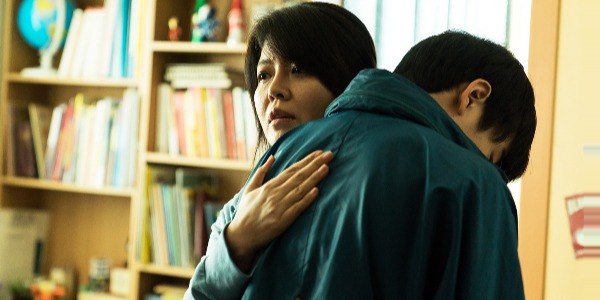
There is a lot to like about Last Child. It’s a pretty nuanced examination of grief, and how people deal with it in different ways, and even Kihyun (the boy who the son in question saved) is a fully fleshed-out character. The first hour or so is melancholic, but also a little heartwarming in nature, and it’s that part of the film which works well. Unfortunately, in the second half, the tone flips completely into something which is more akin to a revenge thriller than a low-key, intimate drama, and it’s not an entirely successful transition. From that point onwards, it ironically loses all of its dramatic weight, and starts to feel a little aimless, and unfortunately I started to get bored.
Last Child is a worthwhile watch if you’re interested in this kind of thing, and you do get the sense that director Dong-seok Shin really understands the characters and their motivations, but I don’t think it’s a classic, and it’s not an entirely satisfying watch. You could do much worse, just don’t expect a classic.
Papi Chulo (John Butler)
Musanna Ahmed: This bittersweet new dramedy from the director of the underrated Handsome Devil occasionally flirts with disaster. The Hispanic representation is almost stereotypical. The subtext is initially somewhat problematic, almost becoming a magical Latino narrative. This is perhaps to be expected in a film titled Papi Chulo, which is ultimately saved by a couple of major twists.
Sean (Matt Bomer) is a weatherman who breaks down in the middle of delivering a forecast, thinking about the separation from his partner Carlos. He insists to his boss Linda (Wendi McLendon-Covey) that those weren’t tears, and she insists back that he should take leave for now. In his time off, he wants to repaint his house’s weathered deck. On the way out of a DIY store, he catches the sight of an elderly Mexican man with a group of fellow immigrants looking for handy work.
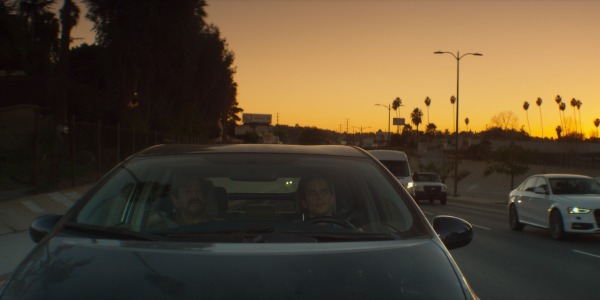
Sean eventually approaches the group and asks if any of them can paint. Ernesto (Alejandro Patiño), the man from before, perks up and says he can do it. Of course, Sean isn’t really interested in hiring anybody else in the first place so off they go. There’s a major language barrier and a huge contrast in personalities between the two, so the first half feels like a pilot for a sitcom following an odd pair. It’s an appealing premise: the dry humour in Sean’s unpredictable work routine for Ernesto, the baggage of hanging around with a regionally famous person, Ernesto’s po-faced confusion to it all. These things form an adventure I’d happily see continue considering they provide scope for depth in theme and humour and because Bomer and Patiño wonderfully play off each other.
The second half of the film, however, throws the dynamic off balance with major revelations about Sean’s character that paint a complex picture of him and provide insight into why he’s sought Ernesto. Despite straightening into a character study of a rich, famous white guy dealing with loneliness and a fractured state of mind, Papi Chulo is involving largely because of Bomer’s lived-in performance. That being said, it comes at the expense of reducing the role of the intriguing Hispanic man, but the silver lining is that the aforementioned representation issues are narrowly avoided. Whilst it misses some opportunities with Ernesto, John Butler’s screenplay and the two leading actors fill Papi Chulo with enough funny and sad moments to be worth a watch.
Suburban Birds (Sheng Qiu)
Alistair Ryder: Film critics are expected to be able to adapt from watching the loudest, crassest blockbusters to the slowest arthouse fare at the tip of a hat – and for some of the critics in my screening, Suburban Birds defeated even their finely attuned sensibilities, due to the sounds of snoring filling up the auditorium throughout. Sheng Qiu’s directorial debut opens with the most monotonous first act you could imagine; a team of engineers exploring an abandoned suburb, investigating the cause of some ground subsidence that had recently led to the area becoming evacuated, its residents moved to a newly built suburb across the river.
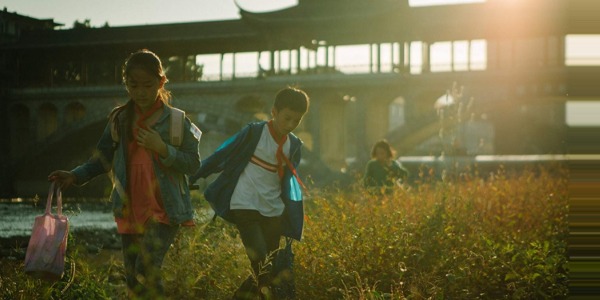
Then, unexpectedly, the film switches gears entirely. One of the workers ventures to a nearby primary school, and chances upon the diary of one of the pupils – as he reads it, we are then plunged without warning into a month in the child’s life, and the film finally takes flight. This bizarre structure immediately brings to mind recent Brazilian drama Araby, albeit with the generations reversed; there, a teenage boy discovers the diary of a factory worker, and the remainder of the film chronicles numerous years in that man’s life. Here, after spending a significant portion of the film within the lives of a group of schoolchildren, we are then thrown back into the adult worker’s life. The official synopsis of Suburban Birds suggests that the diary being read is prophetic, and shares many similarities with the adult worker’s life – and yet this is presented so subtly to have bypassed me entirely, feeling so ceaselessly dull, it’s hard to fathom how it shares DNA with the only section of the film with a pulse.
Thematically, the film feels empty, forever skirting around interesting concepts without ever sticking the landing. For example, the young children often sing songs about the ruling communist party, and their section of the narrative is overshadowed by the move to a newly built suburb. In a filmmaker like Jia Zhangke’s hands, this socio-political undercurrent about the changing face of China would feel crucial to the story being told. Here, it’s just window dressing that fails to add any depth, making for a frustrating watch due to how close these themes were to the director’s grasp, and he fails to address them entirely.
Suburban Birds does suggest that Sheng Qiu has promise as a filmmaker; in the early stages, the precision of the camerawork proves to be overwhelming, suggesting a keen visual eye coupled with the need to innovate narratively. It doesn’t quite coalesce into something with a palpable sense of urgency here, but there’s enough singularity of vision to promise that he’s capable of better things in the future. He’s just not there yet.
Two Plains & a Fancy (Dir: Lev Kalman and Whitney Horn)
Nathan Osborne: Certainly one for acquired tastes, Two Plains & A Fancy cannot stay still. A western, a comedy and with some talk of the supernatural, Lev Kalman and Whitney Horn’s experimental flick is what happens when a Saturday Night Live sketch is stretched to feature-length territory. It itself admits to its absurdity and is proudly ridiculous, but very much like The Death of Stalin – a similar hill I died upon last year when everyone but me seemed to love it – it’s difficult to find enjoyment in something so uneven and wasted.
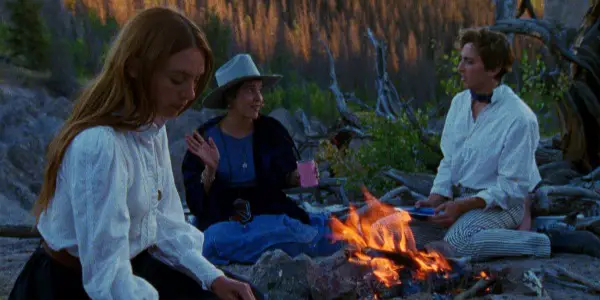
With the dialogue always on the cusp of a punchline – missing more often than it hits – and the digressions wreaking havoc with the tone, it becomes an increasingly frustrating experience. Despite some characterful performances that attempt to settle the genre instability and some well-photographed visuals (enhanced by lovely 16mm shooting), Two Plains & A Fancy is a rudimentary flick; its limited production design, unconvincing costumes and clear attempt to conceal signs of the 21st century prevent it from feeling anything more than a low-budget, below average (but admittedly bold) experimentation.
I’ve no doubt in trusting that Two Plains & A Fancy will find a niche audience – it has all the makings of a small-scale cult classic of sorts – but this uncategorisable farce is too scattershot and messy to come together as something enjoyable for most audiences.
Stay tuned for more London Film Festival coverage next week, including our takes on the Coens’ Ballad of Buster Scruggs, and the new Ben Wheatley effort, Happy New Year, Colin Burstead.
Does content like this matter to you?
Become a Member and support film journalism. Unlock access to all of Film Inquiry`s great articles. Join a community of like-minded readers who are passionate about cinema - get access to our private members Network, give back to independent filmmakers, and more.
Alistair is a 25 year old writer based in Cambridge. He has been writing about film since the start of 2014, and in addition to Film Inquiry, regularly contributes to Gay Essential and The Digital Fix, with additional bylines in Film Stories, the BFI and Vague Visages. Because of his work for Film Inquiry, he is a recognised member of GALECA, the Gay & Lesbian Entertainment Critics' Association.













